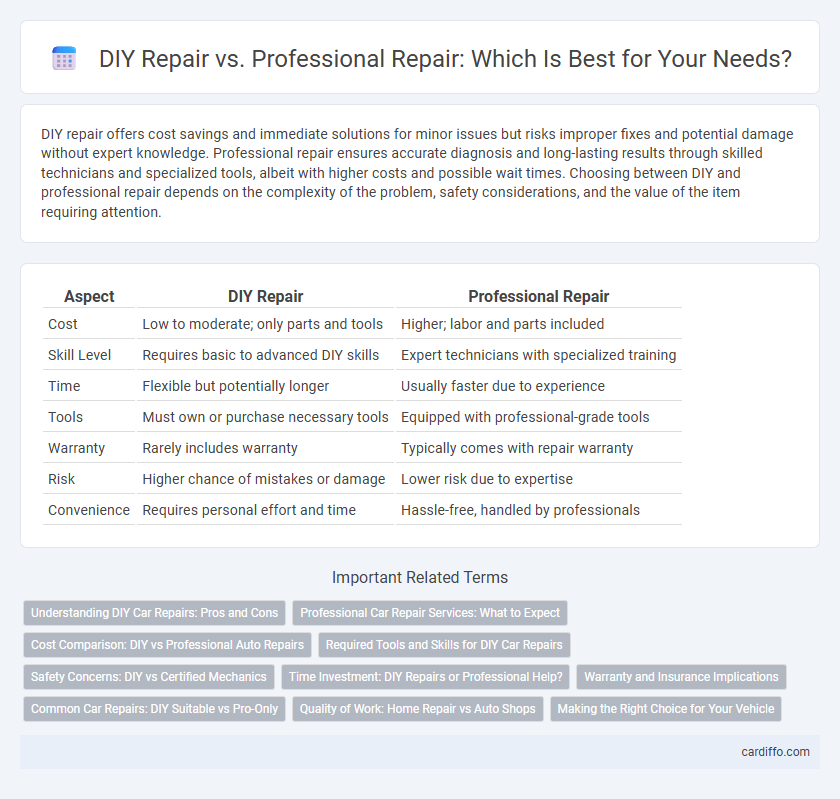DIY repair offers cost savings and immediate solutions for minor issues but risks improper fixes and potential damage without expert knowledge. Professional repair ensures accurate diagnosis and long-lasting results through skilled technicians and specialized tools, albeit with higher costs and possible wait times. Choosing between DIY and professional repair depends on the complexity of the problem, safety considerations, and the value of the item requiring attention.
Table of Comparison
| Aspect | DIY Repair | Professional Repair |
|---|---|---|
| Cost | Low to moderate; only parts and tools | Higher; labor and parts included |
| Skill Level | Requires basic to advanced DIY skills | Expert technicians with specialized training |
| Time | Flexible but potentially longer | Usually faster due to experience |
| Tools | Must own or purchase necessary tools | Equipped with professional-grade tools |
| Warranty | Rarely includes warranty | Typically comes with repair warranty |
| Risk | Higher chance of mistakes or damage | Lower risk due to expertise |
| Convenience | Requires personal effort and time | Hassle-free, handled by professionals |
Understanding DIY Car Repairs: Pros and Cons
DIY car repairs offer cost savings and immediate problem-solving for minor issues, allowing car owners to gain mechanical knowledge and a sense of accomplishment. However, lack of specialized tools, technical expertise, and risk of aggravating the problem can lead to inaccurate repairs, increased expenses, or vehicle safety hazards. Professional repair services ensure precise diagnostics, use of OEM parts, warranty coverage, and compliance with safety standards, though they involve higher upfront costs and scheduling constraints.
Professional Car Repair Services: What to Expect
Professional car repair services provide expert diagnostics and precise repairs using advanced equipment and genuine parts to ensure vehicle safety and performance. Technicians follow manufacturer guidelines and warranty standards, offering reliable solutions that DIY repairs often cannot match. Expect thorough inspections, transparent cost estimates, and extensive post-repair testing to guarantee long-lasting vehicle functionality.
Cost Comparison: DIY vs Professional Auto Repairs
DIY auto repairs typically save 30% to 50% on labor costs compared to professional services, with average parts expenses often reduced by 10% to 20%. Professional repairs include diagnostic fees and warranty coverage, which can offset upfront costs by preventing recurring issues and ensuring quality. Considering tools and time investment, DIY may be cost-effective for minor repairs but professional repairs often provide better long-term value for complex automotive problems.
Required Tools and Skills for DIY Car Repairs
DIY car repairs demand a specific set of tools such as socket wrenches, screwdrivers, diagnostic scanners, and jack stands to perform tasks effectively and safely. Proficiency in mechanical skills, understanding vehicle systems, and the ability to interpret repair manuals are essential for successful DIY maintenance and troubleshooting. Lacking proper equipment or expertise often results in incomplete repairs or further damage, highlighting the importance of accurate knowledge and preparation in DIY automotive work.
Safety Concerns: DIY vs Certified Mechanics
DIY repair often lacks the rigorous safety protocols followed by certified mechanics, increasing the risk of injury or vehicle damage. Certified mechanics undergo extensive training and use specialized tools to ensure repairs meet industry safety standards. Prioritizing professional repair minimizes hazards and ensures the longevity and reliability of automotive systems.
Time Investment: DIY Repairs or Professional Help?
DIY repairs often require significant time investment due to the need for research, tool acquisition, and trial-and-error processes. Professional repair services typically complete tasks faster, leveraging specialized skills and experience to minimize downtime. Choosing professional help ensures efficient time management, especially for complex or urgent repairs.
Warranty and Insurance Implications
DIY repair often voids manufacturer warranties and can lead to denied insurance claims due to non-compliance with service requirements. Professional repair services typically maintain warranty validity and align with insurance policies by using approved parts and certified technicians. This ensures coverage protection and reduces financial risks associated with future damages or defects.
Common Car Repairs: DIY Suitable vs Pro-Only
Common car repairs suitable for DIY include oil changes, air filter replacements, brake pad swaps, and battery replacements, which involve straightforward tools and minimal technical expertise. Professional repair is highly recommended for complex tasks such as transmission repairs, engine diagnostics, and electrical system troubleshooting, where specialized equipment and advanced knowledge ensure safety and accuracy. Attempting pro-only repairs without proper training risks further damage and costly consequences, underscoring the importance of distinguishing between DIY-appropriate and professional-only car maintenance.
Quality of Work: Home Repair vs Auto Shops
DIY repair projects often lack the precision and thoroughness found in professional auto shops, which use specialized tools and expertise to ensure high-quality outcomes. Home repairs may save money initially but risk incomplete fixes that could lead to further damage or safety hazards. Auto shops provide certified mechanics who follow industry standards, delivering durable and reliable repairs that maintain vehicle performance and safety.
Making the Right Choice for Your Vehicle
Choosing between DIY repair and professional repair depends on the complexity of the vehicle issue and your technical skill level. Simple tasks like oil changes or replacing air filters are ideal for DIY enthusiasts, while advanced diagnostics and engine repairs require certified mechanics with specialized tools. Prioritizing vehicle safety and long-term performance ensures the right choice enhances reliability and minimizes costly future repairs.
DIY Repair vs Professional Repair Infographic

 cardiffo.com
cardiffo.com